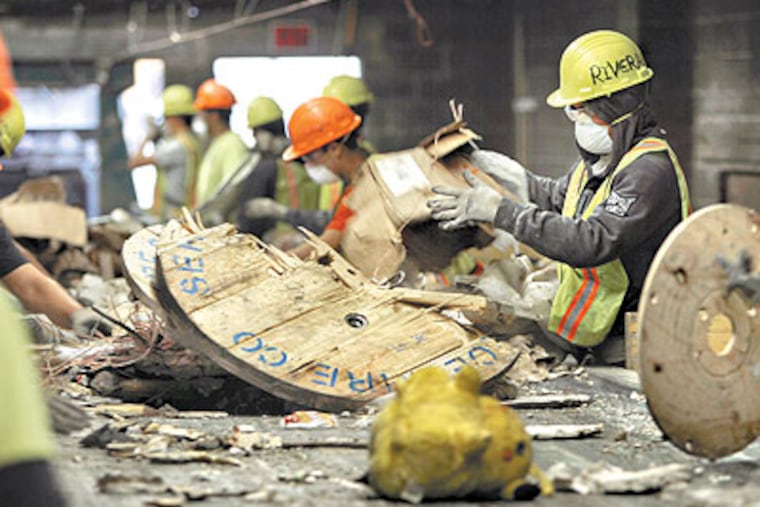Construction-waste recycling company is more than just green
Avi Golen and Jon Wybar have won accolades from the green building community for their work at Revolution Recovery L.L.C., a Northeast Philadelphia company that recycles construction waste.

Avi Golen and Jon Wybar have won accolades from the green building community for their work at Revolution Recovery L.L.C., a Northeast Philadelphia company that recycles construction waste.
But the two entrepreneurs, who have built Revolution Recovery from six employees to 47 since 2008, are aiming for more than environmentally conscious customers.
"Our goal," Golen said, "was never to be a green product," in the sense of charging a premium over traditional waste haulers or only attracting builders needing credits for environmental and energy certification by the U.S. Green Building Council.
A customer said Revolution Recovery had met the objective of not being pegged as a "green" service provider.
"The bottom line is they provide a great service from a construction-waste standpoint," said Jim Kerr, a contract manager and director of sustainability at IMC Construction Inc. in Malvern. "This is a business. It's not like people are willing to pay a huge premium to have their trash recycled."
"We use them for our construction waste whether it's a LEED project or not," said Kerr, referring to the Green Building Council's Leadership in Energy and Environmental Design certification program. "We don't pay more for them. I can tell you that."
Still, Kerr and other construction managers said Revolution Recovery had distinguished itself through its persistence in finding outlets for materials that would otherwise end up in a landfill.
"We found that they were ahead of the pack in terms of the amount of waste they could recycle from a job site and the fact that they provided the best documentation back to us as to where the material ended up," said Mike O'Brien, vice president of business development at W.S. Cumby Inc., a builder in Springfield, Delaware County, that was one of Revolution Recovery's first customers.
In September, Revolution Recovery won a leadership award from the Delaware Valley Green Building Council.
Even outside the green-building sector, waste has become a bigger concern.
"The issue of waste and the issue of what to do with construction debris used to not be an issue at all," said Walter P. Palmer 3d, president and chief executive of the General Building Contractors Association in Philadelphia. "Now every prime contractor thinks about 'what am I going to do with this stuff?' "
Despite that industry shift, Palmer expressed skepticism about how big construction-waste recycling can get.
Golen and Wybar, who became friends as students at William Penn Charter School in Philadelphia's East Falls neighborhood, hope to pick up the pace of growth, with plans to expand to a second location next year. They declined to disclose their annual revenue, but said sales were up 30 percent this year.
Golen, 32, got the idea for the business while clearing construction scraps out of new houses during the housing boom. "I would take out all the scrap drywall. I would take out all the scrap wood" and take it to the dump, Golen said. Golen, who graduated from the University of Colorado at Boulder with a degree in advertising, decided there had to be a better way.
On a bike ride in the Wissahickon area of Fairmount Park in 2005, Golen pitched Wybar on the idea of joining him in a construction-waste recycling business.
"We didn't really know what we were doing, but our timing was great because the U.S. Green Building Council's LEED program was the hot new thing in construction," said Wybar, 34, who has a degree in geology from the University of Texas and was working for an air-quality company in Philadelphia at the time.
In the beginning, they rented a small yard in Southwest Philadelphia and hand-sorted two containers of construction waste a day. When they moved to Revolution Recovery's current location on Milnor Street in Holmesburg, they had one driver and three laborers and rented a corner of the yard, where a large pile of wood chips stood last week.
Now, Revolution Recovery occupies 31/2 acres and has invested $3 million in equipment and in fixing up buildings on the site.
The centerpiece of the operation, which processes about 200 tons of waste per day, is an elevated 250-foot-long conveyor, from which workers pull 13 different categories of recyclable materials, including wood, cardboard, bricks, rigid plastic, plastic film, and wire, and toss them into bunkers below.
In an effort to get the highest price, workers further separate the waste into about 40 different commodities including six or seven different kinds of wire, Wybar said. Last year, Revolution Recovery prevented 78 percent of what it took in from going to landfills, Wybar said.
Revolution Recovery's bottom line is subject to volatile swings in global prices for the scrap metals, paper, and plastics they salvage.
Golen and Wybar said there were too many variables to say what they charge. "We give our best price to the people who send us quality material," Wybar said.
Richard S. Burns & Co. Inc., a competitor that has been in the business longer than Revolution Recovery and posts prices on its website, charges $80 per ton for construction and demolition waste.
Whatever it charges, Revolution Recovery has won fans in the building industry for innovations, such as big cardboard boxes on wheels used to get debris out of high-rises.
Jim Sherman, now senior construction manager at Iron Stone Real Estate, said contractors had that problem when he was project director at Symphony House for Dranoff Properties. "Revolution Recovery came to us with the carts - with bases built from scrap wood - that fit in elevators," he said.
"It doesn't look like an ingenious thing, but it was."
At Revolution Recovery, the goal is "zero waste." Watch how this is done at
www.philly.com/businessEndText